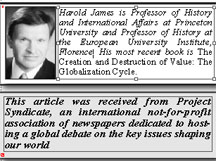By Harold James
PRINCETON – How the mighty International Monetary Fund has fallen. More than a decade ago, the French magazine Paris Match carried a picture of the Fund’s then Managing Director, Michel Camdessus, with the title: “The Most Powerful Frenchman in the World.” Today, his successor, Dominique Strauss-Kahn (DSK), handcuffed and grave in ubiquitous front-page photos, is the most humiliated Frenchman in the world.
One unanticipated result of the lurid New York sex scandal involving DSK is that the question of his successor is attracting an unprecedented level of public interest and concern. Indeed, the scandal has exposed some fundamental problems about the IMF’s governance, and even about its existence.
DSK tried to remake the IMF into a doctor of global finance, rather than a policeman. In mitigating or even preventing financial crises, however, sometimes policemen are needed. At the moment, the combination of excesses still evident in the financial sector and in public finance in many countries calls for some fairly tough police action.
 Any organization is always much more than simply the person who happens to lead it, but a weak or politicized figure at its head can do great damage. Unfortunately, about half of the IMF’s past managing directors have been either weak or overly political – or both.
Any organization is always much more than simply the person who happens to lead it, but a weak or politicized figure at its head can do great damage. Unfortunately, about half of the IMF’s past managing directors have been either weak or overly political – or both.
The IMF’s first two managing directors, the Belgian Camille Gutt and the Swede Ivar Rooth, were both weak figures. Indeed, the Fund almost disappeared into complete oblivion during their tenure.
The IMF’s two most recent managing directors before DSK, a German and a Spaniard, were also weak. Horst Köhler, appointed in 2000, got the millennium started on a bad note. He had been an influential state secretary in Germany’s finance ministry, before becoming the head of the associations of savings banks. Germany’s then chancellor, Gerhard Schröder, pressed hard for a German appointee to lead the Fund, but Köhler was always an implausible second-choice candidate. He resigned in 2004 to run as Angela Merkel’s candidate for the largely ceremonial office of President of the German Federal Republic, a job he performed capriciously until he abruptly resigned.
Köhler’s successor, Rodrigo Rato, had been the leader of Spain’s center-right party, which was unexpectedly defeated in the 2004 general election by current Prime Minister José Luis Rodríguez Zapatero. He was sent to Washington as a consolation prize, and was never very happy there. The IMF’s influence dwindled, and he resigned in 2007 “for personal reasons.”
DSK, too, began his tenure at the IMF as a politician-in-exile, after emerging as French President Nicolas Sarkozy’s most formidable domestic opponent. Sarkozy and his strategists, no doubt, thought that sending DSK to the Fund, which before the global financial crisis looked unimportant and marginal, was a brilliant coup. They may have even calculated that his private life might cause a stir in a country that is both more prudish and prurient than France. But when the IMF reemerged after 2008 as a central global institution, with DSK appearing to reorient it with substantial political and economic skill, he started to look again like a threat to Sarkozy’s re-election bid.
The IMF’s heavy engagement in resolving Europe’s sovereign-debt crisis adds another element of political complexity. Non-Europeans suspected that the Europeans were getting favourable deals under a French politician-turned-economist who wanted to return to politics. And some Europeans worried that the Fund was taking sides in a polarized intra-European dispute about how the costs of the financial crisis should be shared.
Recent appointments to head the IMF have all been pushed through after high-level bargaining among European governments. There is now a need to break decisively with the discredited political logic that drives such decisions.
The convention that the IMF’s managing director needs to be a West European is not written down anywhere, least of all in the Fund’s Articles of Agreement. Indeed, even back in 1973, there was substantial support for a non-European candidate, Roberto Alemann, the distinguished economist and former Argentine economics minister.
The IMF’s history is also a guide to the kind of figure who works most productively in Washington. None of the three most powerful and influential managing directors had been a politician or government minister.
Per Jacobsson, the Swedish economist who brought the Fund back from obscurity in the 1950’s, had been an official at the Bank for International Settlements in Basel. As the BIS’s chief economist in the 1930’s, Jacobsson knew how to use economic analysis as a basis for influence. Jacques de Larosière and Michel Camdessus were French civil servants who combined high-level technical and managerial expertise with a vision of how the world economy should operate.
Today, the world’s overwhelming strategic problem is to adjust to a new economic and political geography, in which the weight of the global economy is shifting eastwards and southwards. It is tempting to conclude that appointing a well-connected figure from an emerging-market economy could solve the problem. But such an outcome would be to repeat the thinking of the past, when the main need was to broker influence between Europe and the US. Appointing an Asian political icon would merely change the names of the players; it would not reinvent the game.
The IMF needs a managing director who transcends political logic and can lay out the economics of the new global order. The next one should be Eastern rather than Western, an economist rather than a politician, and a visionary rather than a tactician.








